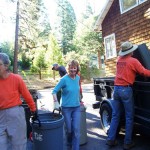In our mountain communities, there is a partnership between all of the “players” involved in the protection of our lives, homes and the environment. The documentation of this partnership is called the Community Wildfire Protection Plan. This document links the public with volunteer groups (Mountain Communities Fire Safe Council and Mountain Area Safety Taskforce) and the government agencies (Cal Fire, Idyllwild Fire and the U.S. Forest Service).
The original CWPP was signed in March 2006 by the Riverside County Board of Supervisors, Cal Fire, Riverside County Fire Department and Idyllwild Fire Protection District. It outlined what the public wanted to see happen on the Hill, and what the agencies and 501(c)(3)s wanted to accomplish.
It is now time to review and update that document. MCFSC is taking the lead, gathering the input from the different groups and ESRI is updating the map products that are part of the document. MCFSC obtained a federal grant from the Dept. of Agriculture (NRCS and FS) to fund the update.
In the May 4 edition of the Town Crier, MCFSC invited everyone to participate in an input survey at mcfsc.org and that survey is still available. When finished, the update will show what has been accomplished and what is yet to be done by everyone involved. Also, from now on, the CWPP will be updated every two years.
Just a few examples of what has been accomplished in the last 10 years are Forest Service maintenance of the Westridge, Strawberry, Southridge and Pine Cove fuelbreaks. Cal Fire has maintained the Red Hill project, fuel reduction along the Ernie Maxwell trail and fuels reduction in our local State Parks. MCFSC has helped finance and contract abatement on about 2,000 parcels of private land in Poppet Flats, Pine Cove, Idyllwild, Garner Valley and the Pinyon communities.
In addition to the fire agencies, MAST has coordinated the efforts of the Riverside County Board of Supervisors, Cal Trans, County Roads, state and local law enforcement, water districts, County Waste Management and County Department of Emergency Services.
It should be noted that all planned projects and goals of the agencies in the CWPP are dependent upon their budgets and all work planned by the 501(c)(3) groups is dependent upon grants.
With wildland fires beginning to break out in Southern California, it’s a good time to write to your elected officials in support of fire prevention/fuels reduction funding for the U.S. Forest Service and Cal Fire. Also, please urge support for continued grant programs for fire safe councils in our state that help homeowners abate their property, including the removal of dead trees. The California state budget begins July 1 and Congress will be debating the 2018 national budget during the summer. Your input matters.










